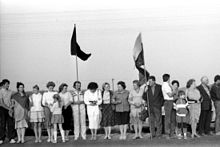Remembering 1989
Almost a week ago today the enigmatic and isolated state of North Korea lost its so-called Dear Leader. Kim Jong-il, aged 69, apparently suffered a stroke on board his custom-built train, and less than 48 hours later the world knew that yet another despot had gone for good.
The scenes of mass hysteria and the inconceivable, syncronised outpourings of grief evinced on the streets of Pyonyang truly baffled me. But then again I remembered having read somewhere that the citizens of the nation's capital constitute the die-hard faithfuls, the privileged few who truly stand to lose everything if the present regime were to collapse. So perhaps the tears weren't shed because of heart-felt devotion to their demi-god of 17 years; as much as because of the realisation that their source of financial security and relative prosperity was gone. What now?
Experts and pundits seem to be in overwhelming agreement that the quiet revolutions in Eastern Europe in 1989 will not be repeated inside North Korea in the foreseeable future. Due to cultural factors, such as intense deference for and devotion to their senior citizens and leaders - the wisdom of the grey-haired, the Northerners on the divided peninsula will most likely bow their necks to their tyrant overlords, and quietly accept their fates.
 They know very little of the outside world, but, certainly, they must know that they aren't truly free?
They know very little of the outside world, but, certainly, they must know that they aren't truly free?
REMEBERING RUMANIA
In 1989, I remember watching on our television set in utter disbelief the rag-tag revolutionary comittee of Rumania announcing the success of their attempt for seize power from one Kim Jong-ils soulmates, Nicolae Caecescu. No one saw it coming, no one expected such a dramatic development inside a country that, similar to North Korea, seemed to be forever incarcerated within the concrete walls of heavy-handed communism. We had learned of the cries of protest and the single acts of defiance on the part of a bold priest in the western part of the country, one Laszlo Tokes, but resistance had been quelched before with brutal finality. We knew that. We had learned it in school:
Hungary 1956; Czechoslovakia 1968 - both sombre reminders of the willingness on part of the Comrades in power to squash any attempt from ordinary citizens to break free from the overwhelming burdens of uniformity. They all more or less longed to break free in Poland, Hungary and East Germany, and breathe freely. Their proletariat paradises had gone bust, fully insolvent as to all forms of capital reserves, except for the spiritual and moral ones. But what we didn't know was to what lengths they - the ordinary citizens - were willing to go in order to achieve their freedom. The dictators of eastern Europe were rightly fearful of what their subjects might do.
WILL IT EVER HAPPEN IN NORTH KOREA?
But what about North Korea, this tottering giant in arms, this defiant loudmouth of nations threatening death and havoc on their neighbour across the 38th parallell? I don't know. But I surely hope that 1989 can indeed be repeated as peacefully now as then. The question is whether the starving and dejected masses can find within themselves the glowing embers of hope for a better future. Because without hope there cannot possibly be change of any noticeable kind, apart from the type of change imposed from the ruling party - the change that in reality is only intended to preserve things they way they are.
Buit, still, the walls of eastern Europe tuimbled when we least expected them to. Could it be that it will happen again? Let's pray. That's what believers within the former Communist states did.



Kommentarer
Legg inn en kommentar